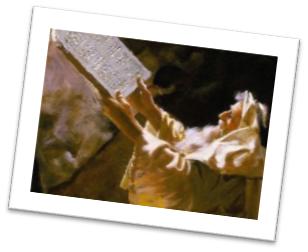The Reading of God's Law in Our Worship Service
The Reading of God's Law in Our Worship Service
Introduction⤒🔗
How familiar the announcement sounds on Sunday morning, "…but we will first hear the holy law of God." From childhood on we are accustomed to hear the law of God read at the beginning of our worship services. If this element of our worship service were to be inadvertently omitted, we would hopefully be disturbed. I purposely said "hopefully," for I am somewhat fearful that for many in the congregation the reading of the law is merely part of the Sunday morning routine, a routine to which many thoughtlessly submit themselves. This is graphically confirmed by the fact that apart from consistory members there are but few in the congregation who bother to open their Bibles when the law of God is read.
My young friend, is the reading of the law a meaningful and edifying experience for you? Have you ever thought about the purpose of the oral reading of God's law prior to the proclamation of God's Word? Have you ever wondered why our forefathers made the reading of the law an integral part of the worship service? Perhaps you have been critical of the practice, and have wondered whether the reading of the law belongs in a service in which the gospel is preached. Let us attempt to find an answer to these questions by examining this practice in the light of Scripture, for only if it is consistent with Scripture can we be assured that this practice is pleasing in God's sight and to the benefit of our souls.
The Reading of the Law: A Reformed Tradition←⤒🔗
Our worship tradition is a Reformed tradition, i.e., it is a tradition which has its roots in the Protestant Reformation. It was the singular objective of the Reformers, being graced with the unction of the Holy Spirit, to make Scripture the only, non-negotiable rule for doctrine and practice. "Sola Scriptura," that is, Scripture alone, was the great principle which motivated them in all their activity.  It is therefore only logical that they applied this principle to the structure of the worship service as well.
It is therefore only logical that they applied this principle to the structure of the worship service as well.
One of the most significant results of the application of this principle was the restoration of the preaching of the gospel as the most important element of the worship service. The Reformers stripped the worship service of all the unbiblical traditions which Roman Catholicism had gradually introduced, so that the preaching of the gospel – if it was even worthy of the name – was but a minor element of the service. The Reformers rightfully understood that it is God Himself, by means of His Word, who speaks to the congregation during the worship service. This understanding motivated them to make all elements of the liturgy (= manner of worship) subservient to the primary event of the service, namely the proclamation of the gospel. All that would in any way detract from the preaching of God's Word was removed from the worship service, which is the reason why until this day a truly Reformed worship service is marked by sober simplicity.
Since the reading of the law can at least be traced back to the days of the Reformation, we may therefore infer that our Reformed forefathers viewed the reading of the law as an important element of the worship service, as a practice which would properly prepare the congregation to hear the proclamation of the gospel. What biblical principles did they apply in determining that the reading of the law should precede the reading of Scripture, and furthermore, that it should precede the preaching of God's Word?
The Law of God: The Revelation of God's Perfect Will for Man←⤒🔗
The law of God as it is recorded in the Ten Commandments is an expression of the eternal mind of God. Therefore when God gave His law at Mt. Sinai, He was not introducing something new to the human race, but He was merely verbalizing what was the perfect rule for man's behavior from the moment Adam was created. When God created man, He created him to function in a dual relationship, namely in a vertical relationship with God and in a horizontal relationship with his neighbor or his fellowman. Since love was to be the fundamental element of this relationship, it was man's sacred obligation to love God above all and his neighbor as himself. This was God's revealed will towards man, and this law they were required to obey. It is at once clear why the Lord Jesus, in response to the lawyer's question, "Master, which is the great commandment in the law?", answered, "Thou shalt love the Lord thy God with all thy heart, and with all thy soul, and with all thy mind. This is the first and great commandment. And the second is like unto it, Thou shalt love thy neighbor as thyself. On these two commandments hang all the law and the prophets" (Matt. 22:36-40). Christ, being also very God, stated with brilliant clarity what the fundamental elements of God's holy law are, thereby giving a precise summary of the two tables of the Ten Commandments.
Since, however, God is both eternal and unchangeable, it logically follows that His law as the expression of His will is also eternal and unchangeable. This of necessity means that man's fall, by which from being a law-keeper he became a law-breaker, has not changed the requirements of God's law in the least. It therefore follows that until this very day God requires from His fallen creatures – who love themselves above all and consequently hate God and their neighbor (see Lord's Day 2) – that they perfectly obey His law. By virtue of His holy and perfect character God cannot compromise these requirements in the least. As a perfect God He can only grant eternal life upon perfect obedience to His law.
However, as fallen, sinful, and imperfect creatures it is impossible for us to meet these requirements any longer, and therefore the way to eternal life by our own adherence to God's law is forever cut off. The Apostle Paul states emphatically that "by the deeds of the law there shall no flesh be justified in His sight" (Rom. 3:20). Since it is therefore utterly impossible to keep the law in a manner pleasing to God, why should the law then continually be held before the congregation each Sunday? Would it not be much better to focus on the gospel only, which reveals the Lord Jesus Christ as the way whereby the guilt of law-breakers can be removed and a perfect righteousness can be obtained? The argument seems to be a plausible one. It is, however, fundamentally flawed! It fails to recognize that fallen sinners will never recognize the value of the gospel unless they are experientially confronted with the perfect and non-negotiable requirements of God's holy law.
The Holy Spirit's Use of the Law in a Fallen World←⤒🔗
It is the Holy Spirit's special task to make room for, to reveal, and to apply the gospel to the hearts of fallen sinners. This order is not arbitrary, and therefore the Holy Spirit will never reveal and apply the gospel, that is, the good news that Christ Jesus came into the world to save sinners (1 Tim. 1:15), before He has made room for this gospel. How then does He make room for the gospel? He does this by bringing sinners face to face with God's holy and perfect law. It is by means of this confrontation that He convinces sinners that they are sinners, that is, that they are lawbreakers. This was Paul's experience. He writes, "Nay, I had not known sin, but by the law" (Rom. 7:7). It is by holding the mirror of God's law before them that the Holy Spirit convinces sinners that "cursed is every one that continueth not in all things which are written in the book of the law to do them" (Gal. 3:10). It is only in this way, when the commandment comes and sin revives, that a sinner will die to all expectation of being reconciled to God in the way of law obedience (Rom. 7:9). It is therefore only in this way that a sinner will recognize the value of the Person and the work of the Lord Jesus Christ who as a Substitute for fallen sinners perfectly obeyed the law of God (His active obedience), and fully paid the penalty for violating the law of God (His passive obedience). Only then will we see the value of a Savior whose righteousness is perfectly acceptable to a perfect God, and which can become my righteousness by faith. And so the Holy Spirit will strip the sinner of His own righteousness in order to clothe him with the perfect righteousness of Christ, which is one of the reasons why Paul states that the law is a schoolmaster to bring us unto Christ, "that we might be justified by faith" (Gal. 3:24). In other words, the Holy Spirit uses the law to prepare the heart for the gospel.
The Ministry of Law and Gospel←⤒🔗
It is this use of the law which we must keep in mind as we seek to ascertain why the law of God is read each Sunday in our worship services. You are perhaps already recognizing that this practice has everything to do with the manner in which the Holy Spirit uses the law, a method which we find in Scripture from Genesis to Revelation.
Already in Paradise, immediately after the fall, we observe that God Himself uses both law and gospel in His dealings with Adam. When God asks Adam the question after He has summoned him to appear in His presence, "Hast thou eaten of the tree, whereof I commanded thee that thou shouldest not eat?" the Creator confronted His fallen creature with the violation of His commandment. By his response Adam reveals himself as a law-breaker, for he blames both God and his wife for what has transpired. However, after this confrontation with the law, God, who in His unspeakable goodness took reasons out of Himself, declares the gospel to His fallen creatures when He gives them the first gospel promise in Genesis 3:15.
At Mount Sinai we observe the exact same sequence. First God declares His holy law from a mountain which thunders and quakes, revealing Himself as a holy and unapproachable God to a sinful, unholy nation of law-breakers. However, was the revelation of His law against the awesome display of His holiness and majesty intended to discourage Israel from approaching unto Him? Not at all! The history that follows makes it very clear that His design was to make room for the revelation of the Tabernacle, by which He would reveal the way whereby a holy God, on the basis of the sacrificial blood, could be the God of an unholy people. By the thunder of the law God prepared Israel for the music of the gospel, expressed by the Tabernacle of witness. How marvelously this structure revealed Jehovah's good pleasure, which graphically conveyed why God could declare, "I will be your God, and ye shall be My people."
This intimate relationship and interaction between law and gospel was furthermore confirmed in Israel's ceremonial worship. What motivated an Israelite to come to the Tabernacle with his sacrificial animal, for the purpose of obtaining forgiveness of sin on the basis of the animal's shed blood? He was motivated to do so by the ministry of Moses, that is, by the ministry of the law. It was Moses' calling to declare God's law in the midst of Israel, not to suggest to Israel that they by keeping the law could merit the favor of God, but to convince them of the necessity of the ministry of Aaron. His ministry was the ministry of the priestly sacrifice, and therefore his ministry – which pre-eminently typified the ministry of the great High Priest, the Lord Jesus Christ – was the ministry of the gospel in the true sense of the word. His ministry was good news to guilty Israelites, as by His ministry God declared, "But with Me there is forgiveness." This explains why we read in Leviticus 4:23, "If his sin, wherein he has sinned, come to his knowledge (by the law), he shall bring his offering (the gospel!)." All this is remarkably confirmed in Psalm 77:20, where it is stated, "Thou leddest Thy people like a flock by the hand of Moses (law) and Aaron (gospel)."
Thus it is until this very day. God still leads His congregation by the hand of Moses and Aaron, that is, by law and gospel. These two elements of the Holy Spirit's method in dealing with sinners are therefore inseparable. The law without the gospel leads to legalism, the abominable, loveless observance of God's law; whereas the gospel without the law leads to presumptuous faith, a faith which is the figment of human imagination rather than the fruit of the Holy Spirit's discovering use of the law. It should be evident by now that it is God's express will that law and gospel, which He has inseparably joined together, be declared together. Therefore, also here it applies that we may not separate what God has joined together.
The Reading of the Law: The Necessary Preparation for the Ministry of the Gospel←⤒🔗
Hopefully, you will now understand why our Reformed forefathers insisted that the law be read prior to the preaching of the gospel. They understood, and knew from personal experience, that God's Spirit, for the first time or by renewal, uses the law to make room for Christ in the hearts of sinners. He uses the law to make room in the hearts of guilty sinners for the good news of the gospel that Christ has been given unto justification, but He also makes room in the hearts of God's polluted people for the good news that Christ has also been given unto sanctification. By the ministry of the law He causes sinners to weep with Paul, "O wretched man that I am! who shall deliver me from the body of this death?" in order that room might be made for Paul's next confession, "I thank God through Jesus Christ our Lord." (Romans 7:24, 25).
Conclusion←⤒🔗
How biblical therefore, is our practice of reading the law before the gospel is preached! How consistent it is with what we read in Luke 4, where it is recorded how Christ, while in the synagogue on the Sabbath, received the book of Isaiah. From Acts 13:15 we know that on the Sabbath both the law and the prophets were read in the synagogue, and therefore we may safely assume that Christ was given the prophecy of Isaiah after the law had been read.  How remarkable it is that He opens the gospel of the Old Testament to the prophecy concerning Himself, and reads, "The Spirit of the Lord is upon me, because He hath anointed me to preach the gospel to the poor" (Luke 4:18). Therefore our practice is truly a Christian, that is, a Christ-like practice.
How remarkable it is that He opens the gospel of the Old Testament to the prophecy concerning Himself, and reads, "The Spirit of the Lord is upon me, because He hath anointed me to preach the gospel to the poor" (Luke 4:18). Therefore our practice is truly a Christian, that is, a Christ-like practice.
How prayerful and reverent our disposition therefore ought to be when the law of God is read in God's house! How it ought to be our prayer that it would please the Holy Spirit to use it to prick us in our hearts for the first time or by renewal, in order that there may truly be room for the preaching of the gospel which will follow. Therefore, when God's law is read next Lord's Day, may you be conscious of what I have tried to share with you in this article, and may it please the Holy Spirit to use the law also in your life as a schoolmaster to bring you unto Christ. May the ministry of Moses also drive you into the arms of the greater Aaron, so that with all spiritual Israelites you may make the heartfelt confession, "Neither is there salvation in any other: for there is none other Name under heaven given among men, whereby we must be saved" (Acts 4:12). Thanks be unto God for His unspeakable Gift!

Add new comment